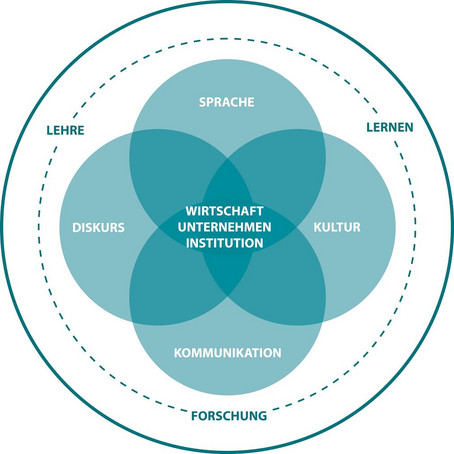Forschung
Mission statement
We understand language(s) and communication as vital for value creation in all economic activities in the commercial, non-profit, and public sectors. Our thematic emphasis and research questions are geared to language use in business and the economy in all its forms. Our theories and methodology are well founded in applied linguistics and in the individual language studies – English, Romance, and Slavic language studies –, as well as in cultural, social, and economic sciences. Our language- and communication-based approach is an integral part of the research and teaching taking place at Vienna University of Economics and Business.
Research Profile
Our research provides innovative insights in the field of (International) Business Communication. The approaches taken in individual research projects comprise a wide range of theories and methodologies; cohesion is ensured by the research profile of the Department, which is based on the interplay of four main areas of study: language(s), discourse, communication, and culture(s).

Language(s): We have a long tradition of research into the language-specific aspects of business and economics for English as well as several Romance and Slavic languages. Research projects focusing on terminology explore lexico-grammatical and lexico-semantic features, genre and register in various business contexts and contribute thus to a better understanding of the characteristics of Language for Specific (Business) Purposes. Research findings in terminology, but also in multilingualism and language choice in business, feed into the teaching programme of our department.
Discourse: Several research projects engage in the study of discourse, that is, language use in context. They focus on discourse in legal, political, commercial or workplace contexts and explore language use in media for business-related purposes across several languages and cultures. This line of research examines discursive strategies that serve to persuade and legitimize, or give expression to and construct particular world views, in order to gain insights into the workings of different genres and the impact of the wider cultural framing of discourse. The findings in this area of study feed directly into enhancing students’ understanding of societal mechanisms of power and control, thus increasing their critical competence and honing their rhetorical skills.
Communication practices: One of the main tenets of research at the Department is the study of communication practices in organizations (internal) as well as beyond organizations (external). This involves the study of communication between different levels of employees, such as managerial communication and intergroup relations, but equally focuses on topics that have more recently gained in importance for a global economy, such as multilingual and intercultural concerns. In view of the importance of communication to the day-to-day activities of organizations, insights gained in this area of study are immediately relevant for students at our University as well as for businesses aiming to better understand and improve their communication practices.
Culture(s): We understand culture(s) as being reflected in but also constitutive of a community’s discourse. Our research helps gain a deeper understanding of how members of a community communicate with each other and with other communities by looking at the interface of language, communication and discourse. Our research projects focus on various cultures and markets where English, Romance or Slavic languages are spoken.
Teaching: The findings originating from these fields are directly relevant for students, instructors and practitioners alike and are linked to the curricula of Language and Business Communication as well as Intercultural Competence courses run by the Department. Students are trained in the effective comprehension and production of a variety of spoken and written business communication formats, and in the intricacies of language use appropriate to specific discursive contexts across several languages and cultures.
Rankings
Das Department für Wirtschaftskommunikation orientiert sich am ERIH Plus Journal Index der European Science Foundation und am Scimago Journal Rank (SJR).
Alle dort gelisteten Zeitschriften gelten als A-wertig. Zudem gilt die Zeitschriftenliste von ANVUR im Rahmen der Einreichung von besonderen Forschungsleistungen. Ein departmentinternes Verlagsranking gilt für Monographien und Beiträge in Sammelbänden.
Genauere Informationen finden Sie in den Regelungen für die Vergabe der Leistungsprämien für besondere Forschungsleistungen.
Prämierte Forschungsleistungen 2024
Folgende Kolleginnen und Kollegen wurden im Jahr 2024 für im Vorjahr erschienene Publikationen ausgezeichnet:
| Gillings, M., Mautner, G. & Baker, P. | Corpus-Assisted Discourse Studies. Cambridge University Press: Cambridge. |
| Gillings, M. & Mautner, G. | Concordancing for CADS: Practical challenges and theoretical implications. International Journal of Corpus Linguistics. 29(1): 34-58. |
| Gillings, M. & Dayrell, C. | Climate change in the UK press: examining discourse fluctuation over time. Applied Linguistics. 45(1): 111-133. |
| Komori-Glatz, M. | A First Step on the Road to EMEMUS: Using ROAD-MAPPING at an Austrian Business University. In: Dafouz, E. & Smit, U. (Hrsg.)., Researching English-Medium Higher Education: Diverse Applications and Critical Evaluations of the ROAD-MAPPING Framework. London: Routledge, S. 74-81. |
| de Caro, F. & Komori-Glatz, M. | Language and talent management: perspectives from MNCs in the Italian food production and distribution sector. Hermes - Journal of Language and Communication in Business 63, S. 143–160. |
| Koller, V., Borza, N., Demata, M., Filardo-Llamas, L., Gustafsson, A., Kopf, S., Miglbauer, M., Reggi, V., Saric, L., Seiler Brylla, C., Stopfer, M. | Voices of supporters: Populist parties, social media and the 2019 European elections. Benjamins. |
| Lutzky, U. | “Doesn’t Really Answer My Question . . .”: Exploring Customer Service Interactions on Twitter. International Journal of Business Communication, 61(1), 92-114. |
| Lawson, R., Lutzky, Ursula, Kehoe, A., and Gee, M. | “‘Sorry to hear you’re going through a difficult time’: Investigating online discussions of consumer debt”. Applied Corpus Linguistics 3(2). |
| Matrisciano-Mayerhofer, S. | Wenn 'smartness' gerade nicht 'digitale Technologisierung' bedeutet: Kommunikative Praktiken des Baustellenmarketings smarter Städte in Frankreich und Österreich zwischen De-Semantisierung und Re-Semiotisierung. In: Werbung und PR im digitalen Zeitalter: Grenzen, Übergänge und neue Formate. 1. ed. Wiesbaden: Springer VS, (Europäische Kulturen in der Wirtschaftskommunikation, Vol. 34). |
| Nothhaft, H. & Seiffert-Brockmann, J. | From Costly Signals and Competitive Niches to Reciprocity, Memes, and Memory Traces: Evolutionary Psychology and Strategic Communication. International Journal of Strategic Communication, 17(3), 151–162. |
| Seiffert-Brockmann, J., Wiggins, B. & Nothhaft, H. | The Meme’s-Eye View of Strategic Communication: A Case Study of Social Movements from a Memetic Perspective. International Journal of Strategic Communication, 17(3), 245–265. |
| Thielemann, N. & Savych, Z. | Corporate Communication at the Intersection of Economic and Political Discourse: The Role of the Nation in CSR Communication in the Ukrainian Energy Sector. In: Konzepte der NATION im europäischen Kontext im 21. Jahrhundert. Salamurović, A. (ed.). Berlin, Heidelberg: Metzler, p. 287-309 (Linguistik in Empirie und Theorie/Empirical and Theoretical Linguistics). |
| Thielemann, N. & Berrocal, M. | Framing the Energy Transition: The Case of Poland’s Turów Lignite Mine. In: International Journal of Strategic Communication. |
| Thielemann, N. & Weiss, D. | Remedies against the Pandemic: How politicians communicate crisis management. 1 ed. John Benjamins. (Discourse Approaches to Politics, Society and Culture, Vol. 102). |
| Thielemann, N. | The social media campaign for Russia’s Sputnik V vaccine. In: Remedies against the Pandemic: How politicians communicate crisis management. 1 ed. John Benjamins, p. 230–255 300 p. (Discourse Approaches to Politics, Society and Culture, Vol. 102). |
| Weder, F. | Cultivation of sustainability in a discourse of change: Perspectives on communication for sustainability as new “norm” and principle of action in socio-ecological transformation processes. In: Journal of Language and Politics. 22, 5, p. 577-600 24 p. |
| Weder, F., Burdon, J. & Kearney, C. | Eco-cultural identity building through tattoos: a conversational approach. In: Frontiers in Communication. 8. |
| Weder, F. | The Evolution of the Sustainability Story: Strategic Sustainability Communication as Niche Construction. In: International Journal of Strategic Communication. 17, 3, p. 228-244 17 p. |
